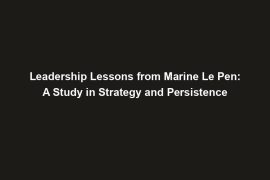Hey there, have you ever heard of King Louis XVIII of France? No? Well, let me give you a quick overview. Louis XVIII reigned as King of France during a tumultuous period in history, facing challenges like the French Revolution and the Napoleonic Wars. Despite these obstacles, Louis XVIII was able to adapt his leadership style and strategies to navigate through these turbulent times.
In today’s world, adaptability is a vital trait for leaders to possess. The ability to adjust to changing circumstances and embrace new opportunities can make or break a leader’s success. That’s why studying Louis XVIII’s experiences can offer valuable insights into the importance of adaptability in leadership.
In this blog post, we’ll delve into the challenges Louis XVIII faced and how he adapted to them. We’ll explore key leadership lessons that can be drawn from his experiences, such as the need for flexibility, resilience, and effective decision-making. So, grab a cup of coffee and let’s dive into the fascinating world of Louis XVIII’s leadership journey!
Louis XVIII’s Challenges and Adaptations
Now that we have a better understanding of who Louis XVIII was and why adaptability is such a crucial trait for leaders to possess, let’s dive into the challenges he faced during his reign as King of France. It’s no secret that Louis XVIII inherited a country in turmoil, still reeling from the aftermath of the French Revolution and the Napoleonic Wars.
The French Revolution and Napoleonic Wars
Imagine being tasked with leading a nation that had just gone through a bloody revolution, resulting in the overthrow of the monarchy and the execution of King Louis XVI. To make matters even more complicated, France was embroiled in years of conflict with its European neighbors under the rule of Napoleon Bonaparte.
Adaptation in Leadership
Despite these seemingly insurmountable challenges, Louis XVIII showed remarkable adaptability in his leadership style and strategies. He understood the need to evolve and change course in response to the ever-changing political landscape. Instead of rigidly sticking to outdated traditions or strategies, he embraced new ideas and approaches to governance.
Examples of Adaptability
One notable example of Louis XVIII’s adaptability was his willingness to compromise with revolutionary forces in order to secure his throne. Instead of stubbornly clinging to the old ways, he recognized the need for reconciliation and unity in the face of division and unrest. This willingness to adapt and evolve ultimately helped him navigate the turbulent times of his reign.
By studying how Louis XVIII adapted to challenges and embraced change, we can learn valuable lessons in leadership. In the next section, we’ll explore some key takeaways from Louis XVIII’s experiences that can inspire and inform modern leaders in their own leadership journeys.
Key Leadership Lessons from Louis XVIII
So, we’ve taken a deep dive into the challenges that Louis XVIII faced during his time as King of France, and how he adapted his leadership style to navigate through turbulent times. Now, let’s shift our focus to the key leadership lessons that we can draw from Louis XVIII’s experiences.
Importance of remaining flexible and open to change as a leader
One of the most important lessons we can learn from Louis XVIII is the significance of remaining flexible and open to change as a leader. In the face of adversity, Louis XVIII didn’t cling to rigid plans or strategies that no longer served him. Instead, he adapted to the ever-changing political landscape, making necessary adjustments to his leadership approach. As leaders, we must be willing to embrace change and pivot when circumstances demand it, in order to lead effectively and steer our organizations towards success.
Value of resilience and persistence in overcoming obstacles and setbacks
Louis XVIII’s story is a testament to the value of resilience and persistence in overcoming obstacles and setbacks. Despite facing numerous challenges, including exile and political upheaval, Louis XVIII never gave up on his quest to reclaim the throne. His unwavering determination and resilience ultimately led to his restoration as King of France. As leaders, we must cultivate these qualities in ourselves, staying resilient in the face of adversity and persisting in our pursuit of our goals, no matter the obstacles in our way.
Strategies for effectively adapting to changing circumstances and emerging opportunities in leadership roles
Louis XVIII’s ability to adapt to changing circumstances and seize emerging opportunities offers valuable insights for leaders today. By staying attuned to the ever-evolving landscape, being prepared to pivot when necessary, and leveraging emerging opportunities to your advantage, you can lead your organization towards growth and success. Louis XVIII’s example reminds us of the importance of being proactive and nimble in our leadership approach.
In conclusion, studying Louis XVIII’s adaptability can provide modern leaders with valuable lessons and inspiration for their own leadership journeys. By remaining flexible, resilient, and proactive in the face of challenges, we can emulate Louis XVIII’s ability to thrive in times of uncertainty and change. So, let’s take these lessons to heart and apply them in our own leadership roles, leading our organizations to new heights of achievement.



